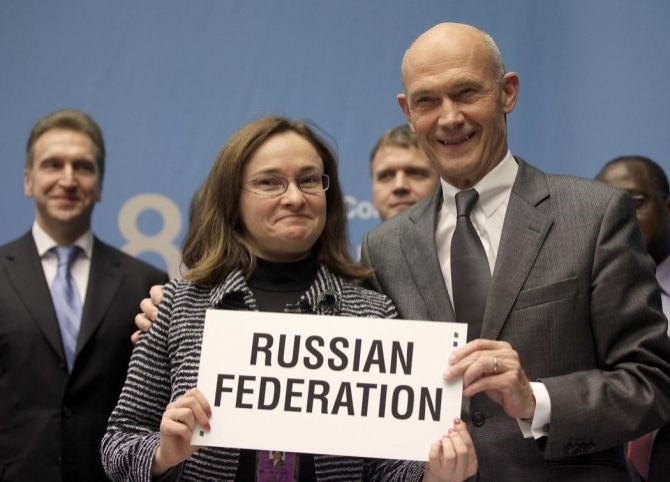Russia Wins Its Bid for WTO Membership

After 18 years of negotiations, Russia won its bid for admission to the World Trade Organization on Friday. Its integration into the global trade body comes two decades after the collapse of the Soviet Union.
“This result of long and complex negotiation is favorable both for Russia and for all our future partners,” President Dmitri A. Medvedev said in a statement read to the Geneva conference by the first deputy prime minister, Igor I. Shuvalov.
Russia has six months to ratify its membership to become the WTO’s 154th member.
"The latest will be May," Shuvalov told Reuters at WTO's ministerial conference in Geneva, just after the WTO approved Russian’s bid for membership. "We need some time and we would like that process to be supported by the people."
WTO Benefits
Russia’s economy is valued at $1.9 trillion, and was the largest outside of the WTO. The accession will help lessen its dependence on energy exports that left the country’s economy seriously exposed to the oil price collapse in 2008.
Participation will promote Russia’s investments abroad by forming a more secure environment for foreign investors, who have complained of corruption, insecure property rights and weak rule of law, as well as aid in the expansion of Russian firms abroad.
"Better and improved allocation of resources within the country... from less competitive to more competitive industries" would be a major benefit to the country, Ivan Tchakarov, chief economist at Russian brokerage Renaissance Capital said to BBC.
Kirill Dmitriev, head of the Russian Direct Investment Fund, said that WTO membership could raise Russian growth by 10 per cent over the next five years and could help provide a solution to the European financial crisis.
“The way out of the European crisis is free trade and more cross-border investment,” Dmitreiv said to The Financial Times, calling the signing on Friday “a very important milestone”.
The WTO Director-General Pascal Lamy said that the accession of Russia to the WTO is a win-win deal, and that not only will it bolster the integration of the Russian Federation into the worldwide economy
“It will bring greater certainty and stability to business operators and trading partners. It is a contribution to the rule of trade law,” he said.
With Russia’s membership the WTO will cover 97 percent of world trade, and will propel the organization into greater universality in the coverage of global trade.
Path to Integration
In the past Russia’s negotiations have been a series of struggles. In 2009, negotiations were close to a result, but when Prime Minister Vladimir Putin launched a regional trade bloc with Kazakhstan and Belarus, it halted the accession process.
The negotiation only resumed in 2010 and achieved significant advancement when Russia finalized terms with the United States and the European Union.
To formally become a WTO member, Russia will have to commit to certain rules and regulations and agree to the demands from existing members.
The Russian government agreed that in the years following accession, it will slash tariffs, do away with industrial subsidies and allow foreign companies greater entry into its domestic market.
“In acceding to the WTO, Russia embraces a series of rules and commitments that are the foundation of an open, transparent and non-discriminatory global trading system. This system provides important guarantees for Russia and for the 153 other Members of our organization,” Lamy said in the conference.
Elvira Nabiullina, Russia’s Economic Development Minister said the country had been awaiting its accession “for a long time.”
“In these difficult times, risks of protectionism are looming on the horizon and Russia will contribute to combat protectionism as a WTO member,” Elvira Nabiullina, Russian Economic Development Minister said.
Despite Russia’s 18 years of struggles to be a part of the WTO, Nabiullina concluded that the accession was not a finish line but a starting point for Russia.



























